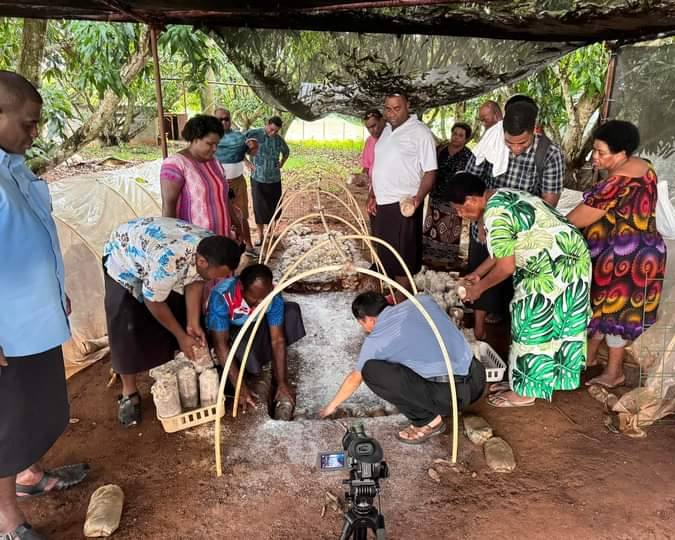NADI METHODIST CIRCUIT MEMBERS LEARN MORE ON JUNCAO TECHNOLOGY
May 24, 2024

Juncao, which literally means "mushroom" and "grass," can be used, as its name suggests, to grow edible mushrooms, as livestock feed or as a green barrier to stop desertification. It is a patented Chinese project which was introduced to Fiji in 2014.
Juncao can serve as a substrate for cultivating edible and medicinal fungi. Additionally, it can be used as an effective feed for livestock like cattle and sheep, addressing the issue of feed shortage during the dry season in the drought-prone areas of western Fiji and promoting local livestock development.
Juncao exhibits rapid growth and a well-developed root system, making it useful for addressing local issues such as soil erosion and soil salinity in addition to its other benefits.
Since the implementation of the cooperation project of Juncao technology in Fiji, the Juncao technology demonstration center based in Nadi, has become the largest of its kind in the Pacific, with more than 600 local farmer households participating in the growing of Juncao.
This week, 60 participants from the Nadi Methodist Circuit participated in a one day training at the Juncao Demonstration Centre in Legalega, Nadi.
The training was requested by the Nadi Methodist Circuit to the Ministry of Agriculture and Waterways, to address two out of the three strategic pillars of the Methodist Church in Fiji which is Education and Economic Sustainability.
The Nadi Methodist Circuit or Wasewase o Nadi consists of around 8,000 members of which five circuits are under their jurisdiction namely the Nadi Circuit, Namaka Circuit, Saunaka Circuit, Korovuto Circuit and Rukuruku Circuit which is led by Reverend Josefa Sewale.
In opening the training, Reverend Sewale reminded the representatives to learn as much as possible and to also pass on the knowledge to members of their respective churches.
The participants learnt about the Juncao Techniques as well as integrated techniques that use Juncao to cultivate edible and medicinal fungi as well as produce forage and fertilizer.
They learnt more on silage making process, grass planting, demonstration plot, mushroom cooking and also toured the facility.
The participants also received certificates at the end of the training as well as 100 grass cuttings each to help them start off their own Juncao plots.
-ENDS-
